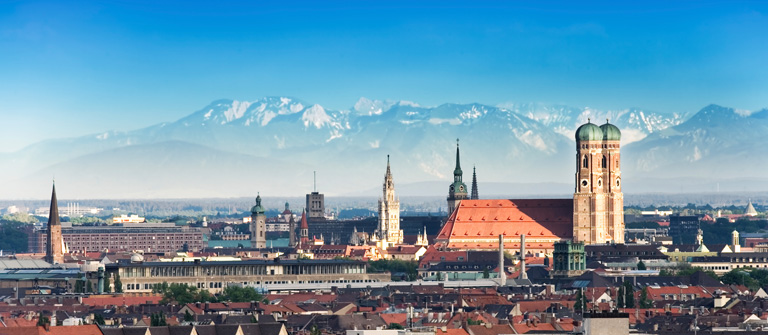 Events - NATO Science & Technology Organization
Today's technology for tomorrow's soldier
Events - NATO Science & Technology Organization
Today's technology for tomorrow's soldier
 Events - NATO Science & Technology Organization
Today's technology for tomorrow's soldier
Events - NATO Science & Technology Organization
Today's technology for tomorrow's soldier
 Munich (German: München, Bavarian: Minga) is the capital city of Bavaria. Within the city limits, Munich has a population of more than 1.4 million, making it the third-most populous city in Germany. Greater Munich including its suburbs has a population of 2.6 million. The Munich metropolitan region which extends to cities like Augsburg or Ingolstadt had a population of more than 5.6 million in 2008.
Munich (German: München, Bavarian: Minga) is the capital city of Bavaria. Within the city limits, Munich has a population of more than 1.4 million, making it the third-most populous city in Germany. Greater Munich including its suburbs has a population of 2.6 million. The Munich metropolitan region which extends to cities like Augsburg or Ingolstadt had a population of more than 5.6 million in 2008.
Munich, located at the river Isar in the south of Bavaria, is famous for its beautiful architecture, fine culture, and the annual Oktoberfest beer celebration. Munich's cultural scene is second to none in Germany, with the museums even considered by some to outrank Berlin in quality. Many travelers to Munich are absolutely stunned by the quality of the architecture. Although it was heavily damaged by allied bombing during World War II, many of its historic buildings have been rebuilt and the city center appears mostly as it did in the late 1800s including its largest church, the Frauenkirche, and the famous city hall (Neues Rathaus).
Munich is a major international center of business, engineering, research and medicine exemplified by the presence of two research universities, a multitude of smaller colleges, headquarters of several multinational companies and world-class technology and science museums like the Deutsches Museum and BMW Museum. It is Germany's most prosperous city and makes it repeatedly into the top 10 of global quality-of-life rankings. Munich's ability to stay at the forefront of technological developments and maintain its cultural heritage is often summarized in the characterization as a city of "laptop and lederhosen".
The System Analysis and Studies (SAS) Panel will hold a Research Lectures Series titled NATO STO Summer School: Decision-Making for the Future. The event (reference SAS-195) will be held in Munich from 08 to 12 July 2024.
The event will provide an educational and scientific knowledge transfer to younger generations (university students or recent graduates) with the goal of increasing the presence of younger generations within NATO (STO) activities. Besides several lectures, special emphasis will be given (i) in the analysis of examples of model-based and data-based operations research techniques, (ii) in the effects of new technologies on defense and (iii) serious game applications that can be used in decision-making processes in defense and war gaming.
The detailed programme for this event is under development.
Participation will be open to nationals (university students or recent graduates) from NATO nations, Australia, Japan, Sweden and Switzerland.
Registration will open in April 2024.
If you already created an account on the STO Events site in the past you can login with the same credentials. If it is your first time to use the STO Events site you will have to sign up first. Please note that these credentials are NOT the same as for Science Connect. We recommend to register your company or governmental email address when creating your STO Events account.
When your registration is validated by the STO and you are logged in to STO Events, you will be able to access the General Information Package that has appeared on this meeting announcement. This document provides you all information needed to make your travel arrangements.